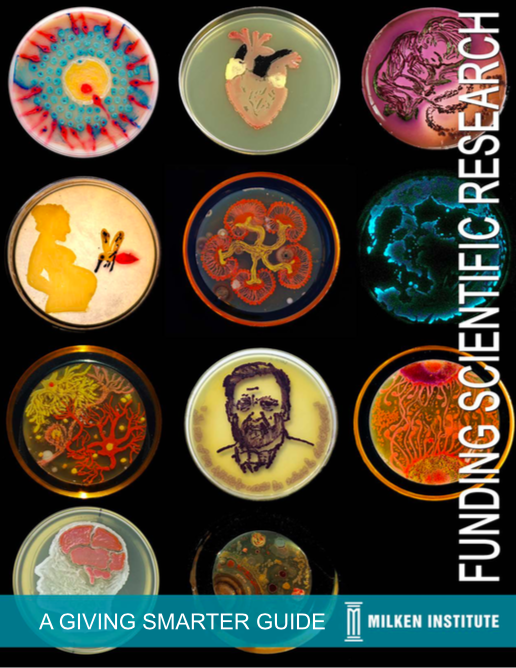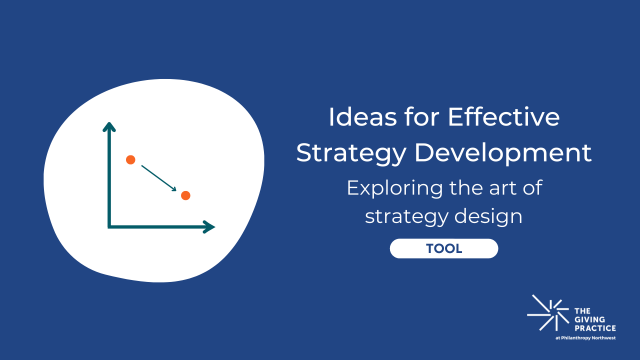How can philanthropists amplify the impact of their investments in scientific research and accelerate medical cures? Regardless of one’s motivations, strategic philanthropic investments in biomedical research require a careful consideration of the philanthropist’s priorities and an understanding of the current state of research to achieve satisfactory results, if not substantial ones.
Apex Foundation recently joined efforts with the Milken Institute Philanthropy Advisory Service Institute to undertake a landscape analysis of current and best practices and produce a primer for funders that addresses the challenges that come with supporting scientific research in academic institutions. The 38-page report, Giving Smarter Guide for Funding Scientific Research, walks prospective funders through the process with a series of questions and key takeaways. 
The goal of producing a useful guide for prospective philanthropists was driven by our desire to share what Apex Foundation has learned from 20 years of experience in the field. Through the course of funding many different academic and medical research initiatives, we’ve learned a lot through trial and error. We’ve learned that in order to have success it is imperative to outline clear objectives and expectations from the outset — from controls on overhead to agreements about intellectual property. Unless collaboration and engagement are incentivized and rewarded, silos will predominate the landscape.
We believe this work may be the most leveraged 30 minutes in which a new or experienced philanthropist, nonprofit trustee or researcher will invest.
Our Advice for Funders and Researchers
Funders:
- Be clear about what you want to accomplish. Put it in writing in your grant agreement. At Apex Foundation, we structure the grant to enable changes based on emerging data during the grant period..
- Require collaboration and participation among your grantees and reward institutional behaviors that promote team science and real-time data sharing. Sadly, the current system of incentives for research encourages silos.
- Phase your grant payments as benchmarks/objectives are achieved. Ask yourself the question; are your investments being spent in ways that ensure strong results, good or bad, and will lead rapidly from the lab to patient care? If not, be prepared to pull the plug.
- We often choose to retain title to any equipment and certain intellectual property in a grant agreement. University presidents and research directors should understand that the income potential from monetizing IP is not material and should not conflict with the primary mission of research universities to disseminate knowledge to benefit society.
- Look for opportunities to leverage your investment from all stakeholders: patients and families, healthcare payers, regulators, funders and patient advocacy organizations, biotech, pharma, medical researchers and the media.
- Engage in administrative and legislative advocacy at the local, state, national and global level to advance your mission.
Researchers:
- Focus on not just the “what” but on the “how” to integrate your findings into patient care and improving medicine and advancing cures. All stakeholders have a responsibility to ensure that applicable research does not end up on the shelf but is put to productive use.
- Communicate important findings in plain, easy to understand language that will be easily understood by all stakeholders.
- Engage your funders as full partners, not just patrons with deep pockets and work collaboratively with all stakeholders sharing all data/results, good or bad, in real time.
- Work with your institution and funders to develop new incentives and rewards for enabling open science. Current incentives are barriers to faster cures.
We think about innovation and leverage constantly. We all need to be more strategic and look at ways to foster greater collaboration and trust among researchers, institutions, disciplines and sectors; and apply leadership and management to the science that can help drive progress. We believe this primer paves the way for funders and the research community to accomplish their respective goals faster and more effectively
And always remember: Our work is not easy, but it’s potentially life-changing and life-saving. We are proud to support this Giving Smarter Guide to help other funders maximize their investments in research and achieve greater impact in furthering their philanthropic objectives.
Craig W. Stewart is trustee and president of the Apex/Bruce R. McCaw Family Foundation. The Giving Smarter Guide for Funding Scientific Research is available for free download.


